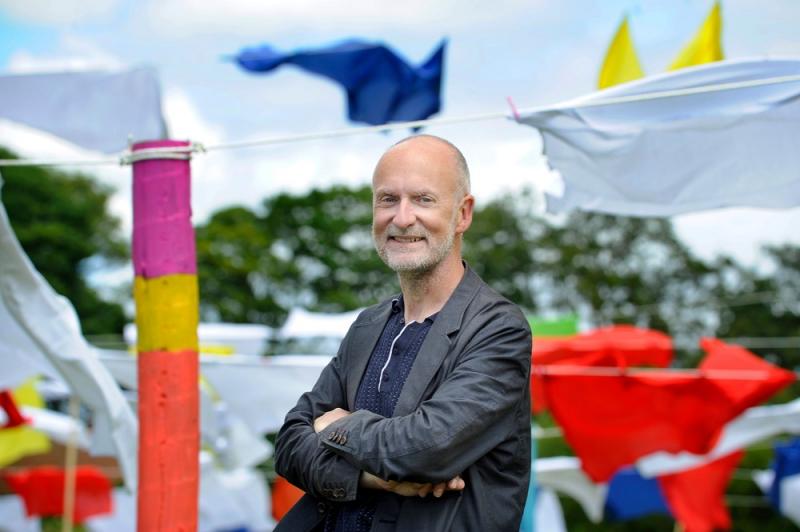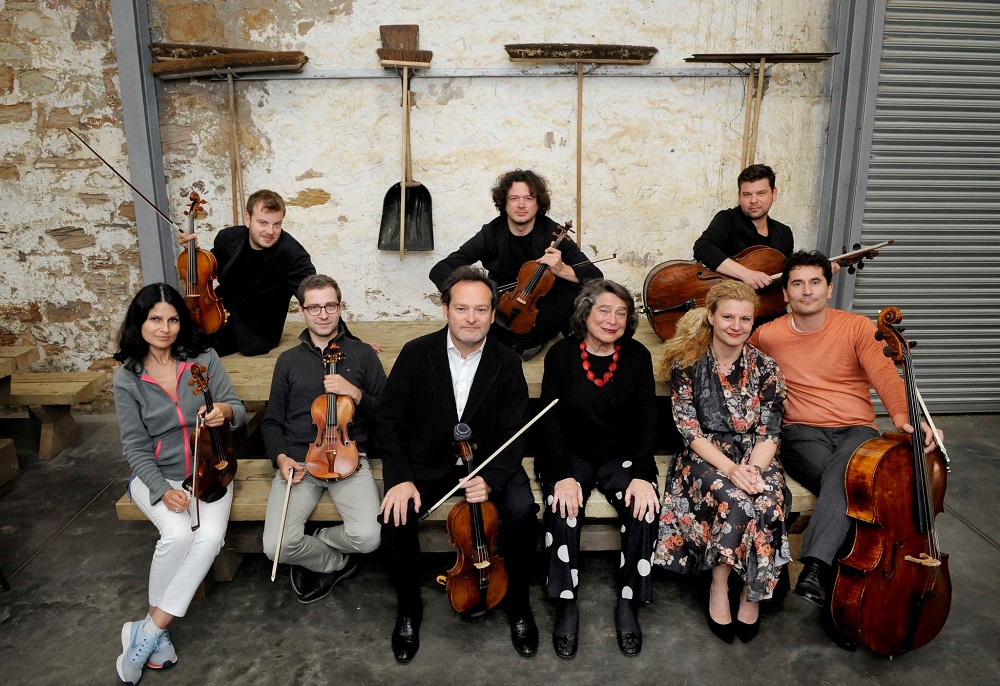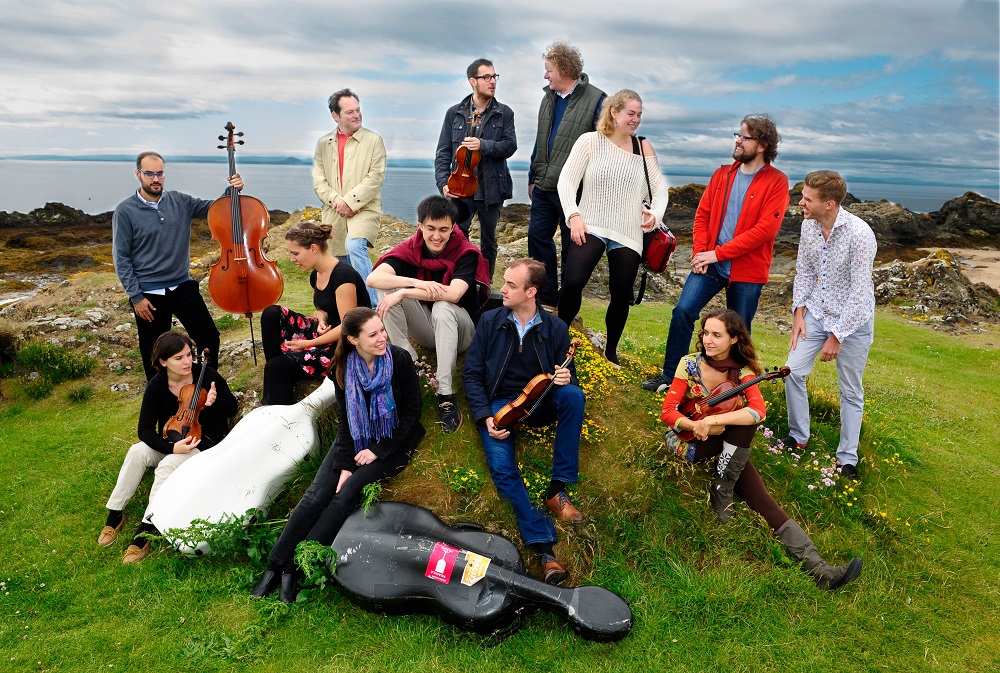‘We are still standing and planning for the brightest future we can’: Svend McEwan-Brown on the survival of a festival | reviews, news & interviews
‘We are still standing and planning for the brightest future we can’: Svend McEwan-Brown on the survival of a festival
‘We are still standing and planning for the brightest future we can’: Svend McEwan-Brown on the survival of a festival
East Neuk Festival Director finds generosity, humanity and a hunger for culture in a crisis

They say that you discover who your true friends are when you find yourself in direst need. East Neuk Festival, our success story on the Fife coast, which should have been happening this week, faced the deepest crisis in its 16-year history this spring when, due to the pandemic, 2020’s festival was cancelled.
When we offered all ENF Patrons a refund of their 2020 donations, only one person took us up on it. Unprompted by us, further donations arrived, some from individuals who had never given before.
When we asked ticket buyers to help us honour commitments to artists by converting the money they had spent on tickets into a donation (for some this amounted to near £1,000) more than half came through.
When we announced the cancellation, Creative Scotland and the many trusts and foundations who had already given grants to ENF allowed us to keep them to tackle the immediate challenges.  Without this generosity ENF would have faced a terrible and immediate catastrophe; as it is, we are still standing and planning for the brightest future we can. It is not easy, especially as our festival offers music that is intimate and close-up (pictured above: members of the Belcea and Pavel Haas Quartets with pianist Elisabeth Leonskaja last year). We march forward on on the crest of a second, quite unexpected wave of finding out who our friends are. It happened when we decided to poll audience views on questions we face in trying to plan a festival without even knowing what the ‘new normal’ might be. Much of it was about face masks, social distancing, queues… joyful stuff. It was when we asked what people missed most with ENF not happening this year that we read responses that really brought home what the value of our festival was to our audience. Here’s a flavour of the responses:
Without this generosity ENF would have faced a terrible and immediate catastrophe; as it is, we are still standing and planning for the brightest future we can. It is not easy, especially as our festival offers music that is intimate and close-up (pictured above: members of the Belcea and Pavel Haas Quartets with pianist Elisabeth Leonskaja last year). We march forward on on the crest of a second, quite unexpected wave of finding out who our friends are. It happened when we decided to poll audience views on questions we face in trying to plan a festival without even knowing what the ‘new normal’ might be. Much of it was about face masks, social distancing, queues… joyful stuff. It was when we asked what people missed most with ENF not happening this year that we read responses that really brought home what the value of our festival was to our audience. Here’s a flavour of the responses:
It represents a wonderful form of human thriving and flourishing.
It is a highlight of our year - the music, the venues, being in Fife with friends, the weather (sometimes).
Live music is my raison d'etre. ENF is accessible and covers very broad tastes. I'm particularly interested in new music and more hearing more unusual works, ENF caters for that.
It’s quite simply the best festival of chamber music across the country. To have this quality and variety on the door step is amazing.
It is just an unbeatable combination of being in a lovely part of the world with great performers and repertoire. It has a special small scale, friendly atmosphere that bigger festivals can't match.
The whole atmosphere of the Festival - the feeling that everyone is enjoying themselves in such wonderful surroundings.
The unique intimacy of world-class musicians playing in these venues. The sense of a gathering of a musical community. The quality of listening and enjoyment of the recitals and concerts; a seriousness of programming which trusts the audience. Tea and cake.
The Festival has always provided great programmes, highest quality musical performances in lovely surroundings, an opportunity to meet with old and new friends and a terrific training opportunity for young musicians.
It is the best thing in Fife since we stopped eating sliced bread.
At a time when there is so much fear, uncertainty, pessimism and anxiety everywhere in the world, reading these comments (there are hundreds more where those came from) has been an inspiration and a very well timed stiffener for the ENF team. They give me personally a humbling sense of how important a contribution events like ENF make to the wellbeing and quality of life of many, many people. Besides the music, there are also senses of community, sharing, social inclusion, spirit, optimism, pleasure, quality of life: that “human thriving and flourishing”. There are small but important things (“tea and cake”) and a sense of welcome: “a special small scale, friendly atmosphere that bigger festivals can't match.” There is important work (“terrific training opportunity for young musicians” - pictured below, the first intake of players for the Retreat course with violinist Alexander Janiczek in red) and fun (“the feeling that everyone is enjoying themselves in such wonderful surroundings”). These things speak to the heart, mind and spirit and they make life better.  We are aware that there are plenty of people in this country – many of them in positions of influence and power over arts funding – who seem to believe that the arts and arts festivals are a luxury, an add-on; comparing our various government responses to supporting the arts through this crisis with what is happening in Germany throws our desperate position into stark relief. Actually, I do not believe that the UK’s attitude to the arts and arts funding is going to change any time soon, so perhaps pointing to Germany is futile. In my lifetime, the arts in the UK have been marginalised in education: opportunities to learn musical instruments and participate in bands and orchestras have dwindled.
We are aware that there are plenty of people in this country – many of them in positions of influence and power over arts funding – who seem to believe that the arts and arts festivals are a luxury, an add-on; comparing our various government responses to supporting the arts through this crisis with what is happening in Germany throws our desperate position into stark relief. Actually, I do not believe that the UK’s attitude to the arts and arts funding is going to change any time soon, so perhaps pointing to Germany is futile. In my lifetime, the arts in the UK have been marginalised in education: opportunities to learn musical instruments and participate in bands and orchestras have dwindled.
We have seen local government spending on regional arts plummet. (When ENF started it received more than £40,000 annually from Fife Council, the same council that now gives nothing and tells us that festivals should be self-sufficient). The budget line for arts in central and local government is always the slimmest of slivers, despite decades of research offering evidence of the wide benefits to anyone at all of participating in or experiencing the arts. We have seen the rise of the tendency to expect the arts to justify public funding either by generating hotel bookings and economic impact; or by trumpeting its outreach credentials. The idea of arts for its own sake is a tough corner to fight, and what we are seeing right now could be read as an acceleration of processes that have been underway for decades.
So, again I say: you discover who your real friends are when you find yourself in greatest need. As we head into the next 13 months of preparation for 2021, with all the uncertainty and risk we face, I am profoundly grateful to know that there are so many individuals out there who genuinely value what ENF does, will step up to help and cannot wait for us to be able to announce the next programme. We aim to do that in November as usual, and look forward to sharing that special festival experience once more in July 2021.
Explore topics
Share this article
The future of Arts Journalism
You can stop theartsdesk.com closing!
We urgently need financing to survive. Our fundraising drive has thus far raised £49,000 but we need to reach £100,000 or we will be forced to close. Please contribute here: https://gofund.me/c3f6033d
And if you can forward this information to anyone who might assist, we’d be grateful.

Subscribe to theartsdesk.com
Thank you for continuing to read our work on theartsdesk.com. For unlimited access to every article in its entirety, including our archive of more than 15,000 pieces, we're asking for £5 per month or £40 per year. We feel it's a very good deal, and hope you do too.
To take a subscription now simply click here.
And if you're looking for that extra gift for a friend or family member, why not treat them to a theartsdesk.com gift subscription?
more Classical music
 RNCM International Diploma Artists, BBC Philharmonic, MediaCity, Salford review - spotting stars of tomorrow
Cream of the graduate crop from Manchester's Music College show what they can do
RNCM International Diploma Artists, BBC Philharmonic, MediaCity, Salford review - spotting stars of tomorrow
Cream of the graduate crop from Manchester's Music College show what they can do
 Classical CDs: Bells, whistles and bowing techniques
A great pianist's early recordings boxed up, plus classical string quartets, French piano trios and a big American symphony
Classical CDs: Bells, whistles and bowing techniques
A great pianist's early recordings boxed up, plus classical string quartets, French piano trios and a big American symphony
 Monteverdi Choir, English Baroque Soloists, Suzuki, St Martin-in-the-Fields review - the perfect temperature for Bach
A dream cantata date for Japanese maestro and local supergroup
Monteverdi Choir, English Baroque Soloists, Suzuki, St Martin-in-the-Fields review - the perfect temperature for Bach
A dream cantata date for Japanese maestro and local supergroup
 Aldeburgh Festival, Weekend 1 review - dance to the music of time
From Chekhovian opera to supernatural ballads, past passions return to life by the sea
Aldeburgh Festival, Weekend 1 review - dance to the music of time
From Chekhovian opera to supernatural ballads, past passions return to life by the sea
 Dandy, BBC Philharmonic, Storgårds, Bridgewater Hall, Manchester review - a destination attained
A powerful experience endorses Storgårds’ continued relationship with the orchestra
Dandy, BBC Philharmonic, Storgårds, Bridgewater Hall, Manchester review - a destination attained
A powerful experience endorses Storgårds’ continued relationship with the orchestra
 Hespèrion XXI, Savall, QEH review - an evening filled with laughter and light
An exhilarating exploration of innovation in 16th and 17th century repertoire
Hespèrion XXI, Savall, QEH review - an evening filled with laughter and light
An exhilarating exploration of innovation in 16th and 17th century repertoire
 theartsdesk at the Dublin International Chamber Music Festival - musical revelations, nature beyond
Artistic director Ciara Higgins’ programming ensures plenty of surprises
theartsdesk at the Dublin International Chamber Music Festival - musical revelations, nature beyond
Artistic director Ciara Higgins’ programming ensures plenty of surprises
 Müller-Schott, RSNO, Søndergård, Usher Hall, Edinburgh - spectacular Shostakovich to end the season
Brilliant orchestral results, while the cellist walks a tightrope in the Second Cello Concerto
Müller-Schott, RSNO, Søndergård, Usher Hall, Edinburgh - spectacular Shostakovich to end the season
Brilliant orchestral results, while the cellist walks a tightrope in the Second Cello Concerto
 Classical CDs: Cannons, culverts and mooching cattle
Box sets celebrating a pair of conductors, plus baroque vocal music and a beguiling bassoon anthology
Classical CDs: Cannons, culverts and mooching cattle
Box sets celebrating a pair of conductors, plus baroque vocal music and a beguiling bassoon anthology
 Marwood, Crabb, Wigmore Hall review - tangos, laments and an ascending lark
Accordion virtuoso’s brilliant arrangements showcase the possibilities of the instrument
Marwood, Crabb, Wigmore Hall review - tangos, laments and an ascending lark
Accordion virtuoso’s brilliant arrangements showcase the possibilities of the instrument

Add comment